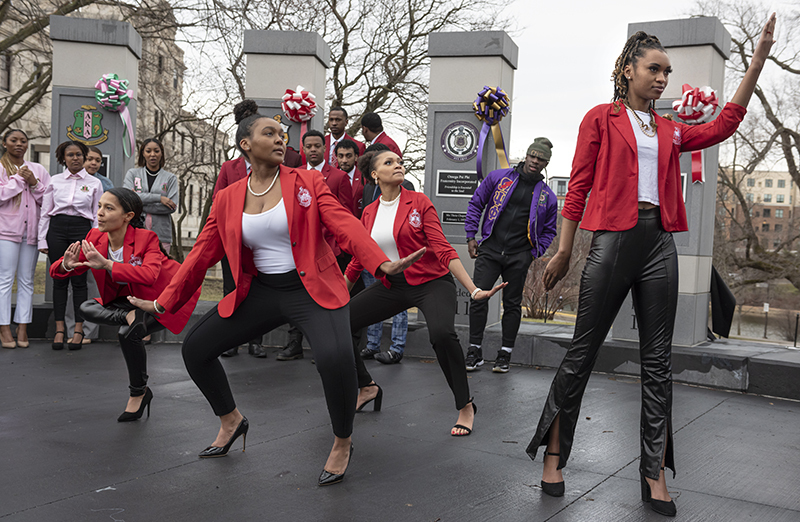One more month to be a student
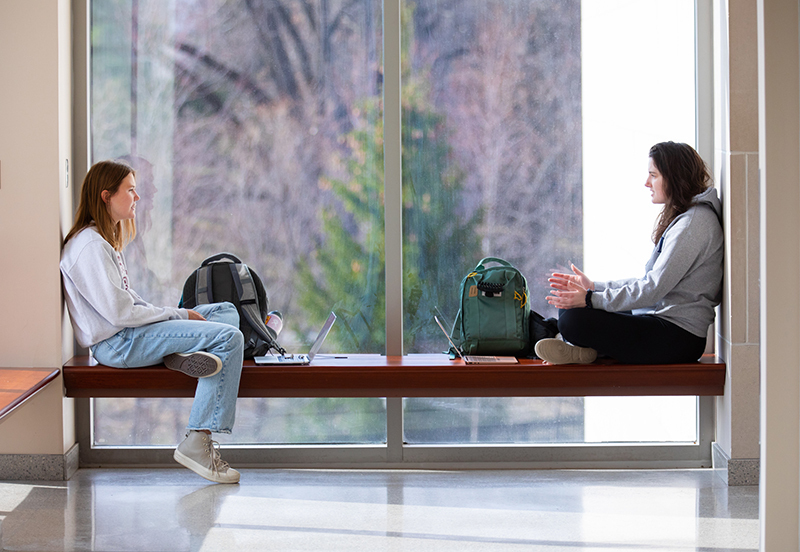
Photo by Christopher Gannon.
Supply chain management graduating seniors Carson Fisher (left) and Haley Jewell enjoy a window study nook in the Gerdin Business Building Monday afternoon.
The duo was working on material for the experimental course, SCM 473X, War and Peace and Supply Chains, which examines how supply chain operations and choices affect peace and can be incentivized to encourage peace, as well as business or supply chain models that encourage peace.
Jewell said the course brings transparency to supply chains around the world for a clearer understanding of what actually does or could happen.
"One aspect of the class I enjoy is the wide range of current events happening today and how they relate to supply chain -- for example, the anti-sweatshop movement, the computer chip shortage, fair trade, the Kimberly process and the banana supply chain," she said. "It all gives me a new sense of what my career could be like after I graduate."
Regents approve 2022-23 faculty P&T requests
Meeting on campus April 7, the state Board of Regents approved promotion or tenure recommendations for 76 Iowa State faculty members, effective for the 2022-23 academic year. The list includes 47 promotions to associate professor with tenure, 28 promotions for previously tenured faculty and one tenure-only award. The full list, broken out by college, is available on the provost's website.
The board also approved a proposal for a specialized retirement incentive program for tenured faculty in the College of Liberal Arts and Sciences (LAS) or one of the six departments LAS jointly administers with the College of Agriculture and Life Sciences (biochemistry, biophysics and molecular biology; ecology, evolution and organismal biology; economics; genetics, development and cell biology; sociology; and statistics).
The application window for the retirement incentive program will be Oct. 3-Dec. 2 this fall, with retirement required by June 30, 2023. Besides tenure, eligibility requirements are:
- Age plus continuous service (on retirement date) total at least 70 years
- Minimum age (on retirement date) is 60 years
- Eligible for Iowa State benefits
- Employee isn't already participating in a retirement plan and didn't previously receive permission to retire or resign
Participants will select from two incentive options:
- Two years of health and dental coverage (employer and employee costs) up to the self and spouse/partner level; and two years of monthly employer's retirement contributions. IPERS plan participants would receive all contributions in one up-front payment.
- Three years of employer's retirement contributions (again in one payment for IPERS plan participants).
The retirement option is one of the first components announced in LAS' plan to resize its budget by June 2026 to reflect changes in student enrollment and demand for academic programs. An estimated 127 tenured faculty are eligible for the incentive program. Savings will depend on how many faculty participate and which incentive option they select.
Parking permits
The regents approved parking permit rates for the fiscal year that begins July 1. Iowa State rates will go up about 4%; the hourly rate ($1.25) at parking meters or metered lots won't change.
ISU lot permits
|
Permit type |
Approved for FY23 |
Current |
|
Reserved |
$605 |
$582 |
|
24-hour Reserved |
$1,045 |
$1,005 |
|
General staff* |
$193 |
$186 |
|
Staff motorcycle |
$64 |
$62 |
|
Departmental |
$226 |
$217 |
|
Vendor |
$338 |
$325 |
*Includes residence department and Ames Lab
The board approved similar increases for permits in Memorial Union parking ramp, which is managed by the MU, not the parking division. Hourly rates at the ramp also will go up 25 cents per hour (to rates of $2.25 to $2.75 per hour), and the daily maximum will go from $17 to $20. The MU also will raise special fees (lost ticket, illegal exit, lost permit replacement) by $10 each.
MU ramp permits
|
Permit type |
Approved for FY23 |
Current |
|
Annual |
$610 |
$585 |
|
Fall or spring |
$266 |
$256 |
|
Summer |
$217 |
$207 |
|
Winter (Nov-Feb) |
$260 |
$250 |
In other Iowa State business, the board approved:
- Two graduate degree programs: a master of entrepreneurship in the department of management and entrepreneurship, and a master of community development in the College of Design (currently an online program associated with the Great Plains Interactive Distance Education Alliance that Iowa State offers with Kansas State, University of Nebraska, South Dakota State and North Dakota State).
- Closing the Center for Catalysis in the College of Liberal Arts and Sciences on June 30.
- Adding a major, professional studies, to the Bachelor of Liberal Studies degree at all three regent universities. Each school may offer select areas of emphasis, minors or certificates for its professional studies students.
- Student housing and dining rates for the year that begins July 1. Meal plan options will increase 3% and room and apartment rates also will increase 3% on average (range of 2.9% to 3.3%) next year. Combined, the price for a standard double room without air conditioning and full meal plan (Cardinal) is a 3.0% increase. Guest rates at the dining centers will rise to $11.10 for breakfast and $14.30 for lunch and dinner.
- A $3 million project to replace the 24-year-old roof and heating, ventilation and air conditioning (HVAC) rooftop system at the Administrative Services Building, and tie in the new HVAC system to the campus chilled water system. The project could begin this summer and conclude in fall 2023. It will eliminate $1.1 million in deferred maintenance.
DEI leadership takes root at college level
Creating a welcoming community is everyone's job on campus, but for a growing number of college leaders, it's the focus of their role.
To help realize the university's commitment to diversity, equity and inclusion (DEI), several ISU colleges now have an assistant or associate dean to provide leadership and direction for creating a more inclusive, diverse and equitable campus. Since it's a relatively (but not entirely) new position at Iowa State, Inside caught up with the five women who serve in a dean-level DEI role -- three appointed last summer -- to talk about their work.
Monic Behnken
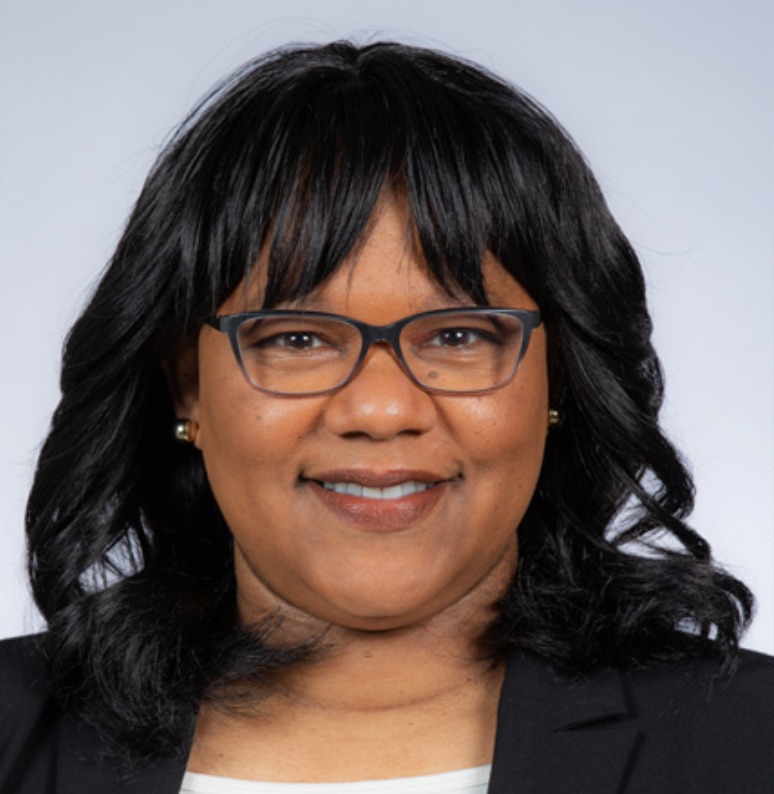
Monic Behnken
Associate dean for DEI, College of Liberal Arts and Sciences
Appointed July 2021
Behnken likens her position to being a house builder. In her first eight months, she's been surveying the land and preparing a foundation.
"You plan out where you want the house to be and then you start digging to make the space for what you want to build in the future," she said.
That's involved meeting with people in the college already working on DEI issues and assessing strengths and barriers. It's a misstep, she said, to launch new projects or initiatives without setting a plan.
"I want us to have a very clear focus and rationale for why we're doing the things we're doing," she said. "I think that's the real benefit of this role. People aren't left to their own devices. When you have someone leading the work, you can meet people where they are and create a cohesive strategy for advancing."
Behnken's goals for the first year are establishing methods of communication, identifying baseline data for measuring success and ensuring the college's DEI team is in place. The team-building includes a not-yet-filled new faculty fellowship for DEI teaching practices, designated DEI leads in each of the college's departments and a redesign of the college-level diversity committee to have a shared governance policy-setting role.
Some colleagues have asked her how the initiative to address the college's ongoing budget deficits will affect its DEI goals, but Behnken said she doesn't expect that it will.
"Treating people with dignity, with respect and with fairness is always free. We can make progress in this area regardless of the challenges -- budget-wise, socio-politically, you name it," she said.
Behnken has helped organizations design and implement alternative methods of serving people in her work as an associate professor of sociology and criminal justice, expertise she relies on in her new post. She's pleased to collaborate with counterparts who, like her, have valuable experience and knowledge to effect change.
"It's not just that there's a lot of us. It's that the people who have been selected for these roles are absolute rock stars," she said.
Theressa Cooper
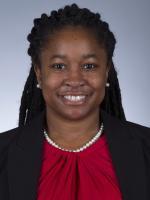
Theressa Cooper
Assistant dean for diversity, College of Agriculture and Life Sciences
Appointed February 2013
For several years, Cooper was the only ISU assistant or associate dean dedicated to DEI work. While she knew adding DEI leadership would be valuable to colleges and large units, she didn't realize how much she'd value it. She's gained a built-in sounding board and support system that deepens the established network of college-level partners such as equity advisors and directors of multicultural student success.
"Now that they're here, I sense the absence that existed before them," she said.
Colleges benefit from adding DEI positions at the senior leader level because it helps intentionally target specific community needs, widen perspectives when making decisions and ensure sustained attention on cultivating culturally responsive change, while providing a unified and holistic vision, Cooper said. Serving in the role requires a grounding in relevant research, an ability to adapt and communicate across cultures, and a mindset for incremental improvement.
"You have to be both realistic and aspirational," she said. "DEI work is a marathon, not a sprint. It requires one to foreground intentionality and purpose while doing this work."
For the first seven years in CALS, Cooper sponsored well-known visiting speakers, monthly lunch and learns, and culturally relevant programs on topics such as bias, intercultural competence, understanding diverse perspective and microaggressions. Listening sessions with concerned students were key to early faculty buy-in, she said.
Now, the college is surveying faculty and staff (last fall) and students (this spring) to be more intentional and strategic about formulating its DEI plan moving forward. The workshops Cooper ran for many years shifted to the department level, led by the diversity committees she pushed to establish as part of the college's governance.
"That step sounds small, but it's huge. It's a game changer. It ensures that diversity, equity and inclusion are embedded at both the college and department levels in a meaningful way and that people are actively supporting and engaged in the work," she said.
Cooper said the changing language usage in the college is another accomplishment. One example is the growing emphasis in CALS on "belonging," as a potential mechanism to promote self-confidence, engagement and well-being for faculty, staff and students.
"Diversity, equity and inclusion has always included everyone. But language-wise, talking about belonging provides some of our people an entry point into this larger conversation, and I just want people to have the conversation," she said.
A few CALS departments are in the process of adopting the term, turning their DEI committees into DEIB committees.
Connie Hargrave
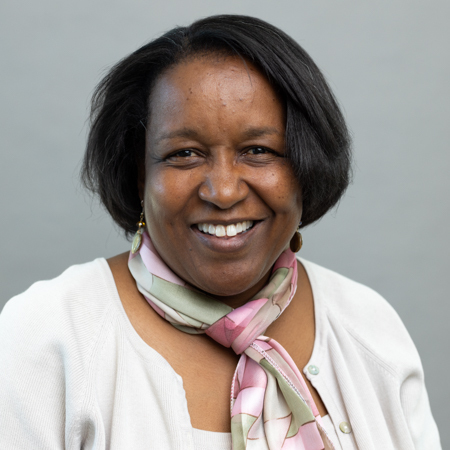
Connie Hargrave
Associate dean for equity and engagement, College of Engineering
Appointed July 2021
One of the benefits of leading equity efforts in the College of Engineering is the analytical approach engineers take to problem-solving, Hargrave said.
"Across a broad spectrum, the nature of engineering is solving technical problems, and you could consider DEI a technical problem," she said. "I think that positions us well to have conversations about the complexities, nuances and challenges that make a focus on diversity, equity and inclusion important and necessary."
That's what Hargrave, a professor in the School of Education and former director of Science Bound, has noticed while mapping out the engineering DEI initiatives already in place and learning about the individual culture of the college's departments, aiming to understand "how and why things work the way they work."
Hargrave sees her position as a way to galvanize and expand those efforts -- and as a signal of their relevance.
"It's a flag waving that says this is central to what we're doing," she said. "It says that creating a diverse and inclusive environment that is equitable across social identities is fundamental to our success as a college."
One initiative that's launched since Hargrave was hired is the college's women's faculty network. The idea -- proposed by Michelle Soupir, professor of agricultural and biosystems engineering and the college's former equity advisor -- is to assist women in male-dominated fields through collective mentoring. In monthly meetings, full professors meet with assistant and associate professors, sharing advice about flexible faculty programs, reviewing promotion materials and discussing issues such as self-doubt.
"We all hear those voices: 'Am I really ready to go for the next promotion?' This is a place for those conversations to happen," Hargrave said. "Just having a group talk about these things brings the tension down."
Valentina Salotti
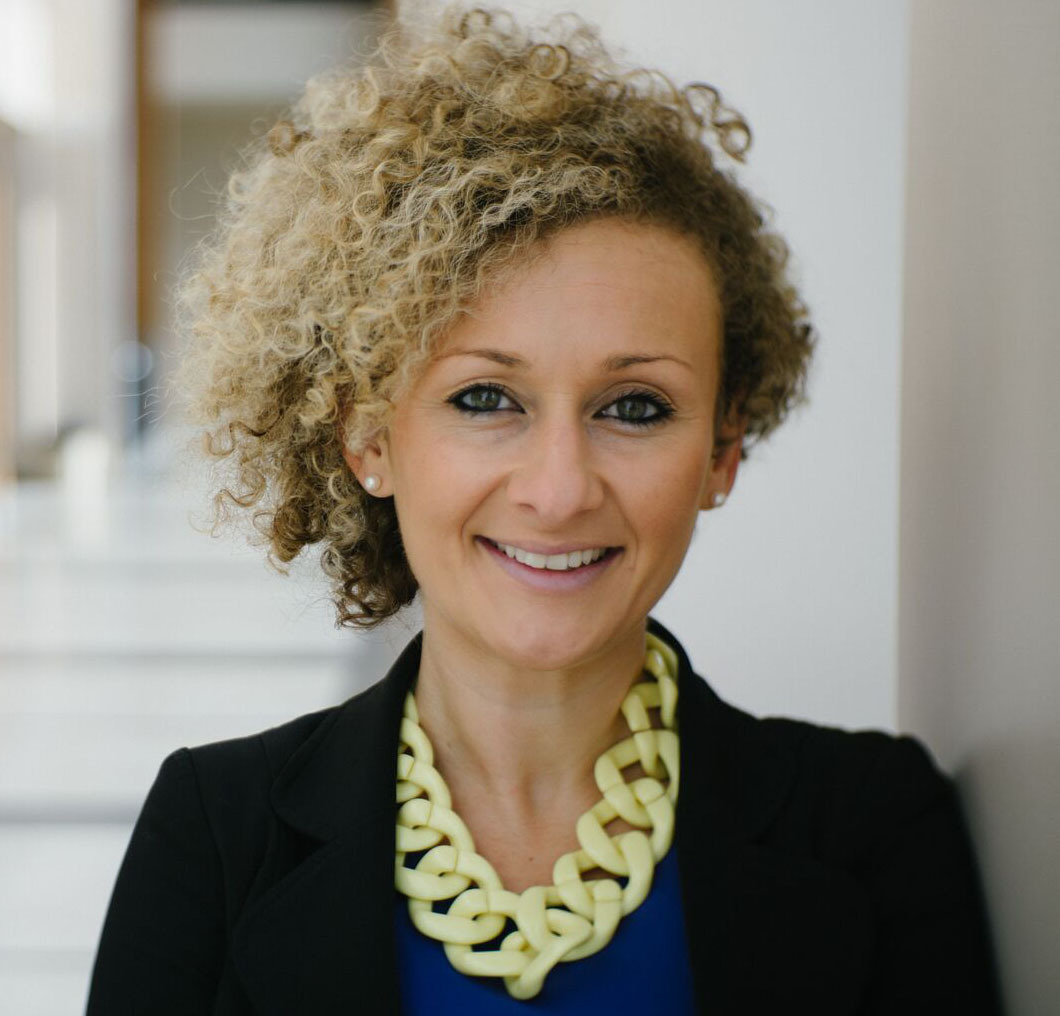
Valentina Salotti
Associate dean for academic affairs and diversity, Ivy College of Business
Appointed August 2021
Issues surrounding diversity and equity already were on Salotti's plate as associate dean for academic affairs, but adding "diversity" to her title last summer gave her the green light to be more proactive.
"That gives you the weight of the responsibility," she said. "Now, it's more about how do we achieve our objectives as a college instead of responding based on feedback."
Salotti is drafting a strategic plan that will define those objectives, basing her initial effort on an analysis of other business schools and surveys of Ivy students, faculty and staff. Focus groups of students and employees will weigh in, and she'll convene a task force to set metrics the college will aim to meet. Surveyed students said clear intent was important in making genuine progress, she said.
"We have a goal to increase diversity, but what does that mean? We need to have a shared definition of where we want to be," she said. "People appreciate that transparency."
Salotti said the most effective framing for promoting inclusion in the college is approaching it as industry does -- a growth opportunity.
"When we think about DEI in our own personal lives, we think about it using a moral argument. And that is 100% true," she said. "But I think it also is important to talk about diversity, equity and inclusion as adding value."
While the college's DEI strategic plan remains a work in progress, Salotti said she has noticed an uptick in the past year in colleagues volunteering to get involved in DEI by sharing their experiences or related research. Having a senior administrator specifically working on inclusivity provides a permission structure that spreads throughout the college, she said.
"When you're trying to create something that wasn't there before, I think other people see that and are encouraged to do the same," she said.
Susan Vega García
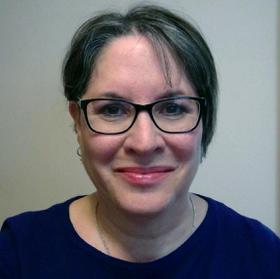
Susan Vega García
Assistant dean for inclusion and equity, University Library
Appointed May 2018
When Vega García was promoted to her assistant dean position, the charge was clear, as there were a number of library DEI programs and initiatives needing oversight, as well as a need for professional development opportunities for library staff.
The professional development opportunities included a series of book discussions, with accompanying materials posted in online library guides. Some of these guides attracted national attention after the protests following George Floyd's murder in 2020, with many organizations asking permission to use the materials to launch their own series. The guide for "How to Be an Antiracist" was the library's most viewed in fiscal year 2021, racking up more than 76,000 hits.
Policy has been another important focus. Vega García helped add a provision to library performance evaluations asking staff to detail their DEI activity when reviewing their work over the last year. It's an achievable way to ensure staff are growing and learning, she said.
"The point is that we are all expected to have something to report, but we've never mandated anyone to do any specific thing. Staff have the choice of what they want to be involved in," she said.
The library also launched a review of its policies for both staff and patrons, looking for ways to increase inclusion. The initiative is prompting changes to four policies, including a reworked policy on general collection development to make it clear that the interests, research, studies and inquiries of faculty, staff and students drive library collection decisions, she said.
Last fall, the library surveyed students served by student accessibility services to gauge accessibility needs, and the eye-opening results are likely to spur some future changes, Vega García said. For instance, many respondents said they are neurodiverse and struggle to find space at the library that's quiet, private and distraction-free.
"Certain areas here are just humming with activity. Many of us here really hadn't considered how difficult that can be for neurodiverse patrons," she said.
Having a leader in charge of DEI at the library has helped create an environment in which talking about those issues is normal and continuous, Vega García said.
"It was a way of marking it as something that wasn't going away and wasn't limited to one or two people," she said.
Senators receive update on Workday Student
Workday Student project co-leads Kristen Constant and Steve Mickelson updated Faculty Senate April 5 on progress to expand Workday to student information and billing.
Constant said the pandemic reinforced why it's key the university's business functions are all on an adaptable platform.
"We found out with COVID that when we went to modify our systems to change our human relations practices or track certain expenditures, all of it was very easy to do," she said. "In the student system, we had to employ programmers for many hours to get into our ancient code for things like grading."
The project began in April 2021 with a plan and discovery stage and will deploy in segments from December 2022 to November 2024.
The phased approach allows for best practices learned from the first phase to be implemented. That includes implementation over numerous months rather than one go-live date, and an internal change management team to handle training and employee adjustment to the technology.
Mickelson said more than 150 faculty and staff are working on the project. They have completed a listening tour across campus to learn what is and isn't working in the current system.
First uses of Workday Student and Receivables will roll out in five phases:
- June 2023: Academic foundation recruiting and admissions, human capital management and finance alignment
- October 2023: Verifying financial aid awards and curriculum management
- March 2024: Student records, academic advising and financial aid packaging
- July 2024: Student financials and payments, financial aid and non-student receivables
- November 2024: Student balances, historical student conversion, graduation, transcripts, and summer grades and degrees
Mickelson said faculty and staff can help by staying informed using the Workcyte website and knowing their change liaison. Liaisons in each college and unit are continuously updated on the Workday implementation. Faculty and staff with feedback about the process can email workcyte_feedback@iastate.edu.
Library initiative
Digital scholarship librarian Erin Ridnour spoke to senators about the Tracing Race at ISU initiative.
"It encourages and supports digital scholarship that centers the history, experience and achievements of Black, Indigenous and people of color at Iowa State," she said. "It is a desire to tell a more complete and inclusive story of Iowa State's history."
Proposals are accepted twice a year (fall and spring) from faculty, staff or students in any department or discipline. Parks Library provides support before and after a proposal is submitted. Once a project is selected, librarians meet with the project team to discuss the scope, timeline, needs and expectations, and check-ins throughout the process, Ridnour said.
The first two projects from the initiative launched in January, and this spring the first undergraduate student project was approved.
Election Day resolution
Senators will vote at their next meeting on a resolution encouraging students to participate in the midterm election on Nov. 8. Faculty are asked to avoid scheduling exams or major assignments on Election Day and provide flexibility regarding tardiness or absence.
"This is an encouragement for instructional faculty, not a mandate," said Karen Kedrowski, director of the Carrie Chapman Catt Center for Women and Politics. "This is a non-partisan voter engagement activity, and it speaks to the mission of higher education in Iowa as articulated by the state Board of Regents."
Other business
Senators will vote at the April 19 meeting on:
- An undergraduate dairy cattle production management certificate in the animal science department. The 24-credit certificate requires a minimum of 18 credits at the 300 or 400 level and at least a 2.0 GPA. After earning the certificate, students will understand the nutrition, physiology and breeding applications in dairy cattle production. The field has increased demand for young professionals with technical competency, and the certificate is favored by potential employers.
- An interdepartmental minor in global human sciences in the College of Human Sciences. It is 15 credits unless students participate in international student teaching, which adds two credits. The minor allows students to increase international engagement without having to travel if they choose not to. It is enhanced by faculty who have taught, conducted research or performed service internationally. Less than 10% of students in the College of Human Sciences participate in study abroad programs each year because of factors, including financial and academic barriers.
- An amendment to the Faculty Handbook on term faculty advancement. It establishes the same rank requirements for advancement committees within departments as used for promotion and tenure committees. It continues the desire to treat term, tenured and tenure-eligible faculty the same whenever possible.
Miller undergrad education grants awarded for next year
Since 1996, the F. Wendell Miller Faculty Fellowship Awards program has awarded $4,012,639 to 222 faculty-led research projects aimed at improving student learning. In this competitive program, 13 projects received funding for the 2022-23 academic year, totaling $225,376. Proposals were reviewed by the Center for Excellence in Learning and Teaching's advisory board, made up of faculty across the university. The funded projects are:
Promoting systems thinking through resilience-oriented design in civil engineering core curriculum
Grant: $15,000
Faculty team: Alice Alipour and Nathan Miner, civil, construction and environmental engineering
This project will update the content of engineering curriculums and the pedagogical strategies used to disseminate it. Training resilience-conscious engineers requires emphasis on systems thinking to understand how the technical, economic, societal and organizational aspects of design are connected. Current curriculums rely on specialization in the field following codes and standards that aren't necessarily designed with systems thinking in mind and, as a result, produce silo-minded, overspecialized students incapable of solving complex problems.
Empowering students for robotic construction era: A technology-enabled course module for 3D printing of structures
Grant: $25,000
Faculty team: Behrouz Shafei, civil, construction and environmental engineering; James Oliver, mechanical engineering; and Benjamin Gleason, School of Education
The proposed course module aims to transform the educational experience of civil, construction and environmental engineering undergraduates by introducing them to fundamental and practical aspects of robotic construction, with a focus on the 3D printing of buildings and bridges. This course module will benefit from both interactive 360-degree videos and augmented reality features to teach 3D printing essentials, using unique resources offered by Virtual Reality Applications Center and Student Innovation Center.
Enhancing learning and promoting equity in animal agriculture through an experiential course in dairy management
Grant: $24,011
Faculty team: Gail Carpenter and Ben Drescher, animal science
The proposed course will augment dairy management courses by allowing students of any background or experience to manage a subset of the cows housed at the ISU Dairy Research and Teaching Unit. Students will be responsible for the daily care of the animals and for all management decisions associated with production, expenditures, investments, animal welfare and sustainability.
Using 3D-printed terrain models to improve spatial thinking in the geosciences
Grant: $9,200
Faculty team: Chris Harding, Aaron Wood, Jacqueline Reber and Igor Beresnev, geological and atmospheric sciences; and Cori Hyde, Research Institute for Studies in Education
Spatial thinking ability (STA), especially the ability to interpret 2D contour maps, is critical for geology students to master and a strong predictor of student success in geoscience and other STEM fields. Traditional teaching methods are inconsistently effective and primarily appeal to students with innate STA, thus impeding student access to STEM careers. 3D-printed, physical terrain models are ideal for helping students successfully apply spatial thinking processes. Using these 3D-printed terrain models, we will develop and assess map-centric STA exercises for classes, labs, field trips and the ISU field camp in Wyoming.
Digitizing sample collections: An avenue into enhanced observation skills
Grant: $9,120
Faculty team: Ben Johnson, Lindsay Maudlin, Aaron Wood and Jacqueline Reber, geological and atmospheric sciences; and Carly Manz, genetics, development and cell biology
The proposal is to design a model for incorporating 3D photogrammetry into teaching lab exercises to help students hone their critical observation skills of physical samples. We hypothesize that "knowing" the sample via photogrammetry will discretize the learning process, reduce cognitive load on students and benefit academic ability and identity within STEM. The proposal includes establishing protocols and assessment tools for transferring this method to courses both in our departments and across campus.
Integrating industry-defined nontechnical skills into the curriculum
Grant: $25,000
Faculty team: Katherine Madson and Jennifer Shane, civil, construction, and environmental engineering; and Tina Coffelt, English
Using job postings, this project will identify the most desirable nontechnical skills for construction engineering graduates, determine employers' intent in seeking those skills and develop course material that can be implemented across construction engineering courses to effectively teach these nontechnical skills. By providing a scaffolding approach to the developed material, students can engage in more advanced content as they progress through their degree programs.
Promoting student well-being and self-efficacy through peer support networks
Grant: $19,191
Faculty team: Corinna Most and John Pleasants, ecology, evolution and organismal biology; Clark Coffman, Mohan Gupta and Hua Bai, genetics, development and cell biology; Mollie Appelgate, School of Education; and Tom Neppl, landscape architecture
This project aims to increase student success through the intentional use of peer mentors and structured activities to promote students' overall well-being and sense of self-efficacy. The proposed courses are aimed primarily at biology and genetics majors in their second and third semesters but will be open to all students interested in STEM. As students struggle with this transition and potential uncertainty and self-doubt, it is key that they have access to a supportive community.
Increasing the adoption of automated writing support through curricular integration
Grant: $23,447
Faculty team: Jim Ranalli, Jenny Aune and Casey White, English
This project seeks broad implementation of Grammarly at ISU by establishing an empirically grounded, collaboratively developed course-integration model, based in ISUComm's advanced communication courses. It also can be implemented in other high-enrollment courses and lead to wider adoption of the grammar assistance tool.
Project-based entrepreneurship within Accreditation Board for Engineering and Technology (ABET) outcomes
Grant: $10,000
Faculty team: Dave Sly and Gary Mirka, industrial and manufacturing systems engineering; Anuj Sharma, civil, construction and environmental engineering; Matt Nelson, aerospace engineering; and Steve Bell, agricultural and biosystems engineering
This proposal is for the development, execution and ABET-qualified evaluation of a course-based set of (Engineering) collegewide projects targeted at sophomores and juniors. The projects and their evaluation criteria will be designed to introduce students to entrepreneurial skill sets and mindsets in a manner that fosters a deep understanding of the customer and their requirements considering available market solutions. This effort will focus on the design and prospective customer presentation and evaluation of those designs.
Learning networks instructional dashboard
Grant: $14,986
Faculty team: Rachel Smith and Michael Brown, School of Education; Nicholas Fila and Joseph Zambreno, electrical and computer engineering
This project's purpose is to improve instruction and student career readiness in electrical and computer engineering by implementing a peer network-based dashboard in the senior design courses that allows instructors to observe student team collaboration. The dashboard summarizes student behavioral engagement, team formation and performance, and classroom learning community structure by combining self-reported peer interaction data with behavioral engagement data from Canvas. The combination of student relational and individual engagement allows the course instructor to provide targeted individual and team support throughout the semester.
Enhancement and curriculum development for the Construction and Infrastructure Visualization Laboratory
Grant: $20,507
Faculty team: Roy Sturgill, Brad Perkins and Renee Fleming, civil, construction and environmental engineering
This project will build on resources in the Construction and Infrastructure Visualization Laboratory by creating curriculum for five courses in the construction engineering degree program. The curriculums will advance a student through Bloom's Taxonomy regarding visualization tools as a student progresses through their degree. 3D models will be introduced, applied and created in the courses applying this curriculum. Previous investment in visualization technology allows students to be immersed in these 3D models, familiarizing them with the most current technologies and enhancing visualization skill and interest through new technological tools.
Latinx oral histories in Iowa: Collaborative and interdisciplinary approaches to teaching, learning and community outreach
Grant: $4,920
Faculty team: Lucía Suárez, world languages and cultures; and Daniel Hartwig, Parks Library
This project will develop a new course that explores Latina/o/x life stories, with community outreach and digital archive components, that connects students to each other and Latinx communities. Through collaborative and multimodal learning, students will:
- Recognize the difference between memoir and oral history
- Tutor memoir-writing skills to MUJERES Club at Marshalltown High School
- Examine the oral histories produced by the University of Texas, Austin, "Voces of a Pandemic Oral History Project," of which ISU is a member
- Produce an oral history to be archived and featured at Parks Library and with the National Voices Project
Undergarments: Responding to sensitivities for people with Mast Cell Activation Syndrome through research-focused design solutions
Grant: $24,994
Faculty team: Ling Zhang and Rachel Eike, apparel, events and hospitality management
Through science-grounded activities, students will gain experience researching, producing and evaluating undergarment design solutions for people who suffer from extreme skin sensitivities associated with Mast Cell Activation Syndrome. Innovative teaching tools will be applied in classes, including computer-aided design pattern-making, virtual fitting, product lifecycle management software, product experiments and industry expert interactions. Students will benefit from new teaching modules, learning materials, in-class activities and assignments.
Community celebrates central campus plaza
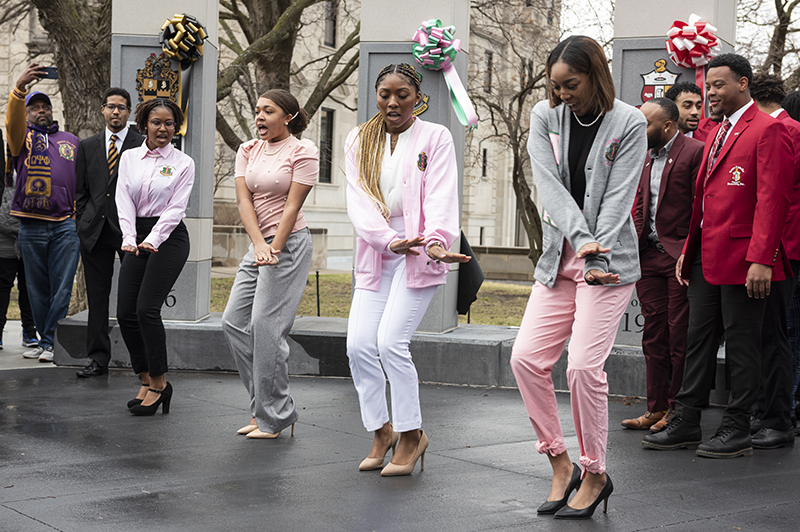
Undergraduate members of the Eta Tau chapter Alpha Kappa Alpha Sorority (joint chapter with Drake University) participate in the National Pan-Hellenic Council "unity stroll" following the official ribbon cutting. Photos by Paul Gates.
More than 350 braved a cool, wet afternoon April 3 to help officially open the National Pan-Hellenic Council Plaza on the northwest lawn of the Memorial Union. The plaza's nine columns honor the nine historically Black fraternities and sororities of the council, eight of which have chapters at Iowa State.
Following the ribbon cutting on the plaza, undergraduate members participated in a unity stroll -- steps and moves unique to each chapter and rooted in the Greek organization's history to show unity, strength and togetherness.
The student affairs division provided seed money to construct the plaza, with the goal of covering most of the estimated $400,000 cost with private gifts. University alumni, friends, employees and current students already have supported the project, and fundraising efforts are ongoing, including a FundISU site, which will remain live for several weeks this spring.
Landscaping also will be completed this spring around the plaza site.
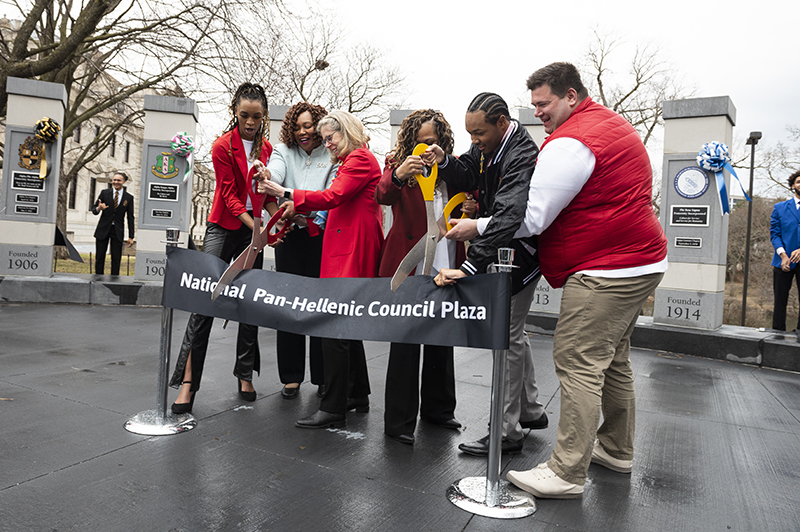
Cutting the ribbon on the plaza April 3 were (l-r) senior Nadine Veasley, National Pan-Hellenic Council vice president and member of Delta Sigma Theta Sorority; Toyia Younger, senior vice president for student affairs and member of Alpha Kappa Alpha Sorority; President Wendy Wintersteen; Sharron Evans, associate vice president for student affairs and dean of students and member of Delta Sigma Theta Sorority; ISU alumnus Jonathan Hall, NPHC past president and member of Alpha Phi Alpha Fraternity; and Billy Boulden, associate dean of students and director of sorority and fraternity engagement.
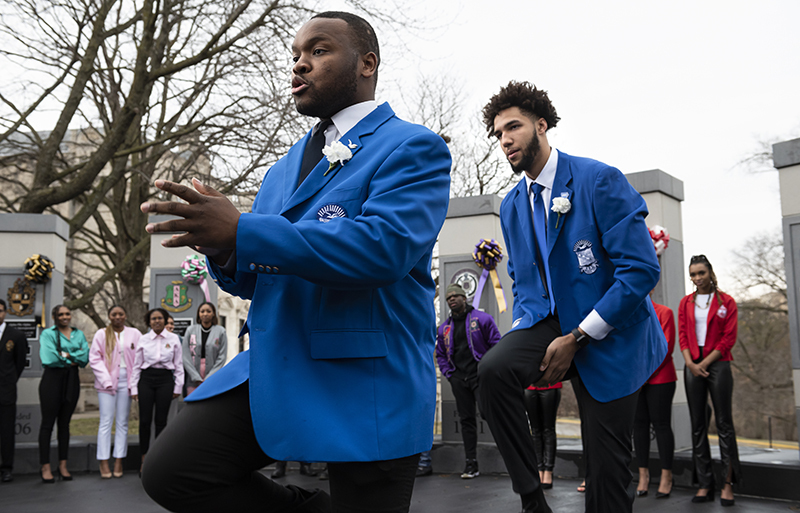
Undergraduate members of the Kappa Gamma chapter of Phi Beta Sigma Fraternity participate in a National Pan-Hellenic Council "unity stroll" following the official ribbon cutting.
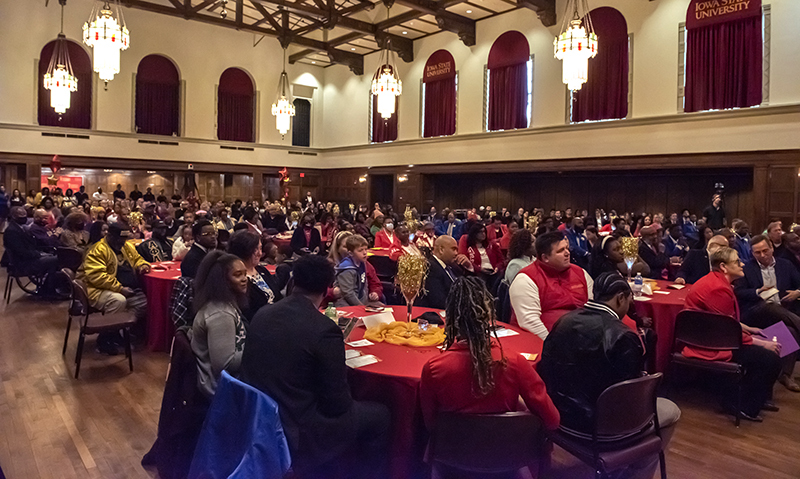
The Memorial Union Great Hall was a full house for the indoor portion of an April 3 opening of the National Pan-Hellenic Council Plaza.
Related story:
Central campus plaza opens this weekend, March 31, 2022
